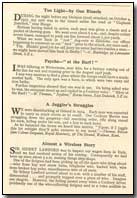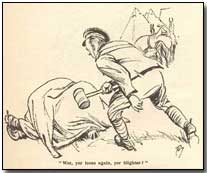Memoirs & Diaries - The Best 500 Cockney War Stories - By One Rissole and Other Stories
 Published in London
in 1921, The Best 500 Cockney War Stories
comprised, in the words of its newspaper publisher (The London Evening
News) "a remembering and retelling of those war days when laughter
sometimes saved men's reason".
Published in London
in 1921, The Best 500 Cockney War Stories
comprised, in the words of its newspaper publisher (The London Evening
News) "a remembering and retelling of those war days when laughter
sometimes saved men's reason".
The collection of short memoirs, some 500 in total, is divided into five categories - Action, Lull, Hospital, High Seas and Here and There. This page contains five stories from Lull, led by Too Light - By One Rissole.
Other sections within the collection can be accessed using the sidebar to the right.
Too Light - By One Rissole
During the night before my Division (21st) attacked, on October 4, 1917, my unit was in the tunnel under the road at "Clapham Junction," near Hooge.
Rations having failed to arrive, each man was given a rissole and a packet of chewing-gum. We went over about 6 a.m., and, despite rather severe losses, managed to push our line forward about 1,300 yards.
When we were back in "rest" dug-outs at Zillebeke, our officer happening to comment on our "feed" prior to the attack, my mate said: "Yus. Blinkin' good job for old Jerry we never had two rissoles a man - we might have shoved him back to Berlin!"
C. Hartridge, 92 Lancaster Street, S.E.1
Psyche - "at the Barf!"
I was billeting at Witternesse, near Aire, for a battery coming out of the line for rest and training prior to the August 1918 push.
I was very anxious to find a place where the troops could have a much-needed bath. The only spot was a barn, in which were two rusty old iron baths.
Further inspection showed that one was in use. On being asked who he was, the occupant stood up and replied in a Cockney voice: "Sikey at the Barfl"
H. Thomas, "Ivydene," Herne Grove, East Dulwich, S.E.22
A Juggler's Struggles
We were disembarking at Ostend in 1914. Each man was expected to carry as much stores as he could. Our Cockney Marine was struggling down the gangway - full marching order, rifle slung round his neck, kitbag under his arm, and a box in each hand.
As he balanced the boxes we heard him mutter, "S'pose, if I juggle this lot orlright they'll poke annuver in my mouf."
Thomas Bilson (late Colour-Sergeant, Royal Marines), 56 The Strand, Walmer, Kent
Almost a Wireless Story
Sir Sidney Lawford was to inspect our wagon lines in Italy, and we had received notice of his coming. Consequently we had been up since about 5 a.m. making things ship-shape.
One of the fatigues had been picking up all the spare wire lying about - wire from hay and straw bales, telephone wire, barbed wire, wire from broken hop poles, miscellaneous wire of all sorts.
Sir Sidney Lawford arrived about 11 a.m. with a number of his staff, dismounted... and promptly tripped over a piece of wire. Imagine our chagrin.
However, the feeling passed away when a Cockney driver (evidently one of the wire-collecting fatigue) said in a voice audible to everyone as he peeped from under the horse he was supposed to be grooming: "Blimey, if he ain't fallen over the only piece of blinking wire in Italy!"
F. Praid (late Lieut., R.F.A., 41st Div.), 88a High Street, Staines
When the S.M. Got Loose
We were behind the lines at Merville in 1914. It was raining hard and it was night.
"Smudger" Smith, from Lambeth, was on night guard. The horses were pulling their pegs out of the mud and getting loose, and "Smudger" was having a busy time running around and catching them and knocking the pegs in again with a mallet.
The sergeant-major, with a waterproof sheet over his head, visited the lines.
"Smudger," seeing something moving about in the dark, crept up, and muttered, "Wot, yer loose again, yer blighter?" - and down went the sergeant-major.
W. S. (late Queen's Bays), 2 Winsover Road, Spalding
Next - Mons, 1914 - Not Moscow 1812!
The USA suffered 57,476 fatal army casualties during the war.
- Did you know?

